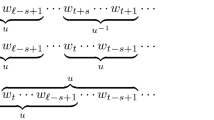Abstract
We consider the problem of testing the commutativity of a black-box group specified by its k generators. The complexity (in terms of k) of this problem was first considered by Pak, who gave a randomized algorithm involving O(k) group operations. We construct a quite optimal quantum algorithm for this problem whose complexity is in Õ(k 2/3). The algorithm uses and highlights the power of the quantization method of Szegedy. For the lower bound of Ω(k 2/3), we introduce a new technique of reduction for quantum query complexity. Along the way, we prove the optimality of the algorithm of Pak for the randomized model.
For their research support, F.M. thanks the EU 5th framework program RESQ and the French Research Ministry, and A.N. thanks Canada’s NSERC and CIAR.
Access this chapter
Tax calculation will be finalised at checkout
Purchases are for personal use only
Preview
Unable to display preview. Download preview PDF.
Similar content being viewed by others
References
Grover, L.: A fast quantum mechanical algorithm for database search. In: Proc. of 28th ACM STOC, pp. 212–219 (1996)
Mosca, M.: Quantum Computer Algorithms. PhD thesis, Univ. of Oxford (1999)
Beals, R., Buhrman, H., Cleve, R., Mosca, M., Wolf, R.: Quantum lower bounds by polynomials. J. of the ACM 48, 778–797 (2001)
Babai, L., Szemerédi, E.: On the complexity of matrix group problems I. In: Proc. of 25th IEEE FOCS, pp. 229–240 (1984)
Watrous, J.: Quantum algorithms for solvable groups. In: Proceedings of 33rd Symposium on Theory of Computing, pp. 60–67. ACM, New York (2001)
Pak, I.: Testing commutativity of a group and the power of randomization. Electronic version (2000), at http://www-math.mit.edu/~pak/research.html
Szegedy, M.: Quantum speed-up of markov chain based algorithms. In: Proc. of 45th IEEE FOCS, pp. 32–41 (2004); Also arXiv.org report quant-ph/0401053
Ambainis, A.: Quantum walk algorithm for Element Distinctness. In: Proceedings of 45th IEEE FOCS, pp. 22–31 (2004)
Buhrman, H., Spalek, R.: Quantum verification of matrix products. Technical Report quant-ph/0409035, arXiv archive (2004)
Nielsen, M., Chuang, I.: Quantum Computation and Quantum Information. Cambridge University Press, Cambridge (2000)
Kitaev, A., Shen, A., Vyalyi, M.: Classical and Quantum Computation. Vol. 47 of Graduate Studies in Mathematics. AMS (2002)
Aaronson, S., Shi, Y.: Quantum lower bound for the collision problem. J. of the ACM 51, 595–605 (2004)
Kutin, S.: A quantum lower bound for the collision problem. Technical Report quant-ph/0304162, arXiv archive (2003)
Ambainis, A.: Quantum lower bounds for collision and element distinctness with small range. Technical Report quant-ph/0305179, arXiv archive (2003)
Sinclair, A.: Algorithms for Random Generation and Counting: A Markov Chain Approach. In: Progress in theoretical computer science. Birkhäuser, Boston (1993)
Aldous, D.: Random walks on finite groups and rapidly mixing Markov chains. In: Séminaire de Probabilités XVII. Lecture Notes in Mathematics, vol. 986, pp. 243–297. Springer, Heidelberg (1981–1982)
Griffeath, D.: Coupling methods for Markov processes. In: Rota, G.C. (ed.) Studies in Probability and Ergodic Theory, pp. 1–43. Academic Press, London (1978)
Nechaev, V.: Complexity of a determinate algorithm for the discrete logarithm. Mathematical Notes 55, 165–172 (1994)
Shoup, V.: Lower bounds for discrete logarithms and related problems. In: Fumy, W. (ed.) EUROCRYPT 1997. LNCS, vol. 1233, pp. 256–266. Springer, Heidelberg (1997)
Schnorr, C., Jakobsson, M.: Security of signed ElGamal encryption. In: Okamoto, T. (ed.) ASIACRYPT 2000. LNCS, vol. 1976, pp. 73–89. Springer, Heidelberg (2000)
Author information
Authors and Affiliations
Editor information
Editors and Affiliations
Rights and permissions
Copyright information
© 2005 Springer-Verlag Berlin Heidelberg
About this paper
Cite this paper
Magniez, F., Nayak, A. (2005). Quantum Complexity of Testing Group Commutativity. In: Caires, L., Italiano, G.F., Monteiro, L., Palamidessi, C., Yung, M. (eds) Automata, Languages and Programming. ICALP 2005. Lecture Notes in Computer Science, vol 3580. Springer, Berlin, Heidelberg. https://doi.org/10.1007/11523468_106
Download citation
DOI: https://doi.org/10.1007/11523468_106
Publisher Name: Springer, Berlin, Heidelberg
Print ISBN: 978-3-540-27580-0
Online ISBN: 978-3-540-31691-6
eBook Packages: Computer ScienceComputer Science (R0)




